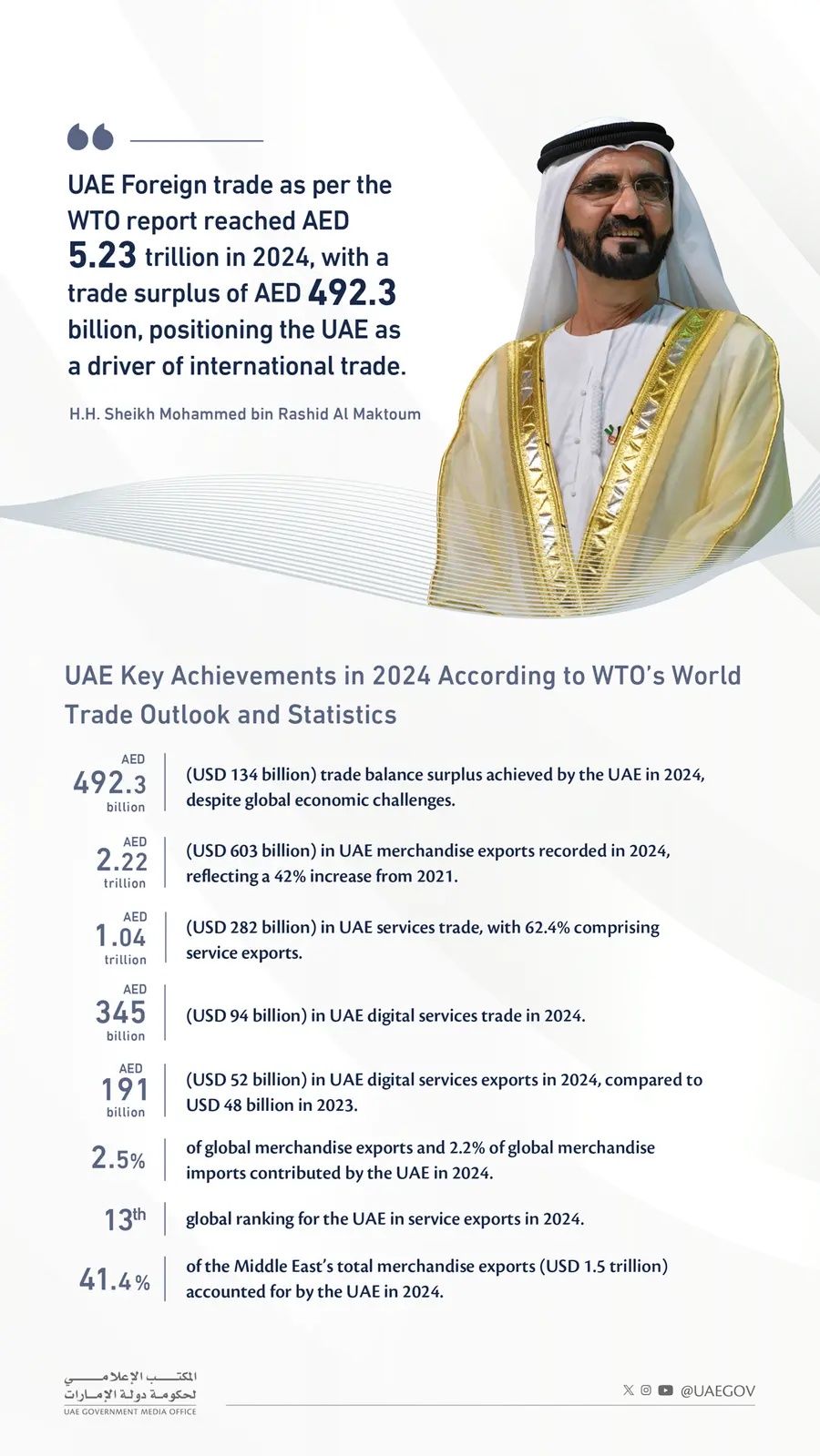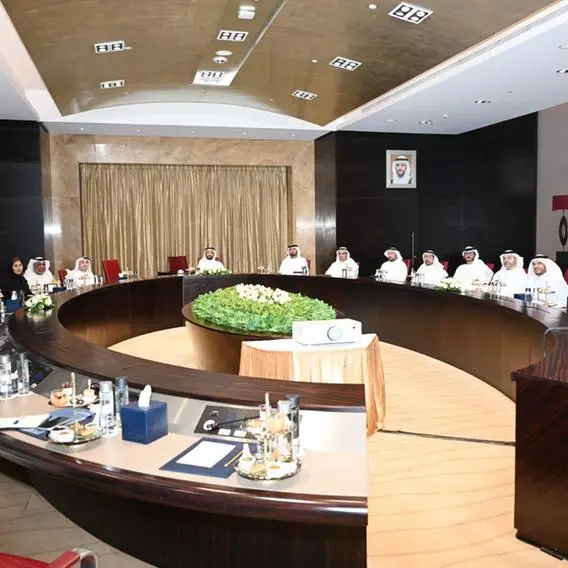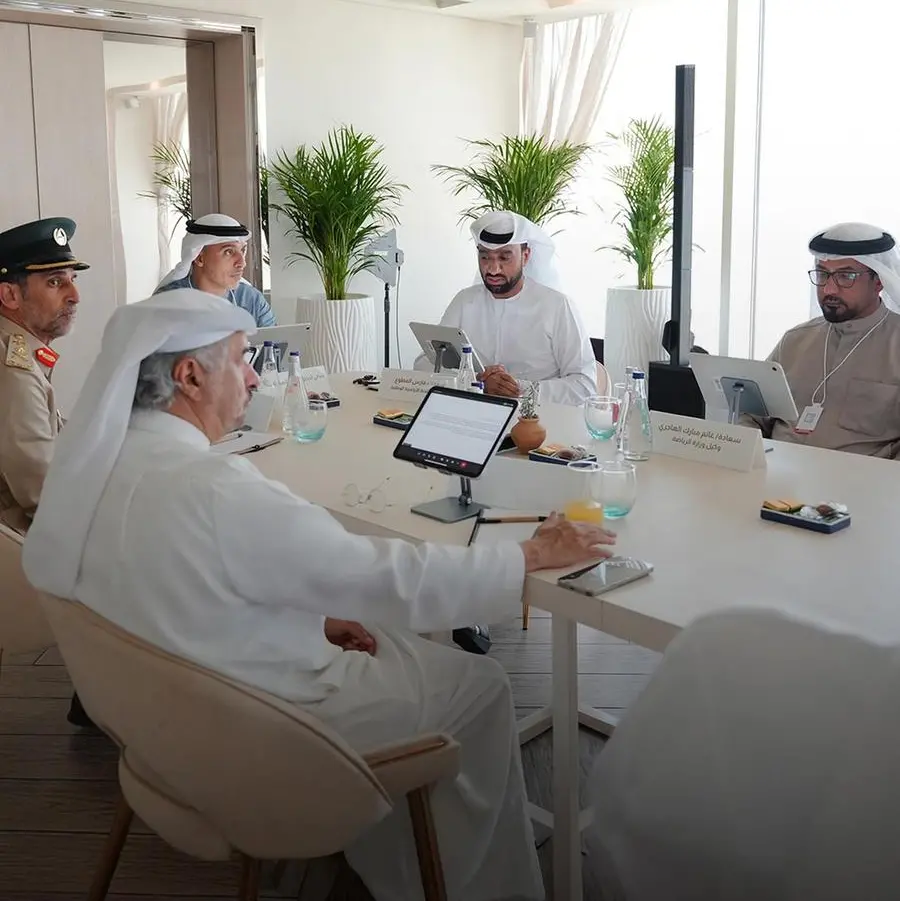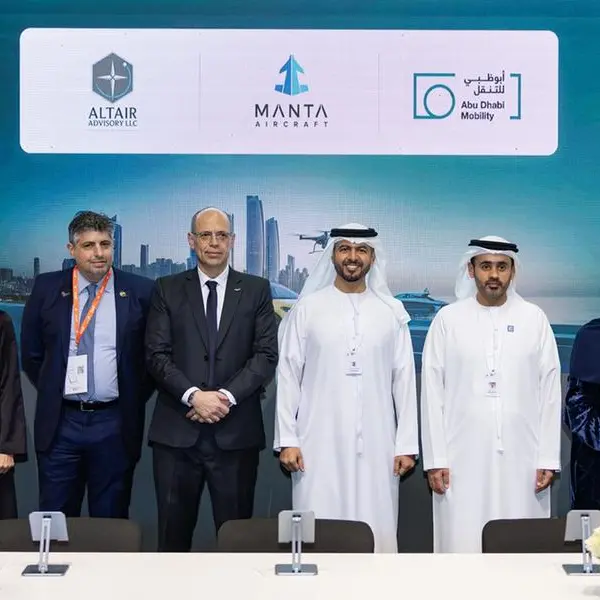PHOTO
United Arab Emirates – The United Arab Emirates recorded total foreign trade of AED 5.23 trillion (USD 1.424 trillion) in 2024, a 49% increase from AED 3.5 trillion (USD 949 billion) in 2021, according to the World Trade Organization’s “World Trade Outlook and Statistics” report.
This robust growth reflects the UAE’s strategic economic vision, reinforcing its position as the leading trade hub in the Middle East and Africa since 2014 and among the top 20 global trade centers for goods and services.
In a global trade environment marked by 2.9% growth in merchandise trade and 6.8% in services trade in 2024, the UAE’s performance underscores its resilience amid rising tariffs and uncertainties.
His Highness Sheikh Mohammed bin Rashid Al Maktoum, Vice President, Prime Minister and Ruler of Dubai, emphasized the UAE’s role as a global trade hub: “In a world of economic and trade challenges, the UAE has prioritized openness, connectivity, and the free flow of trade, capital, and people, establishing itself as a vital link between East and West and a global economic center.”
His Highness Sheikh Mohammed bin Rashid Al Maktoum highlighted key achievements from the WTO report:
- Foreign trade reached AED 5.23 trillion in 2024, with a trade surplus of AED 492.3 billion, positioning the UAE as a driver of international trade.
- The UAE ranked 11th globally in merchandise exports and 13th in services exports.
- Services exports totaled AED 646.6 billion, including AED 191 billion in digital services, comprising 30% of service exports.
- Merchandise exports amounted to AED 2.22 trillion in 2024.
- The UAE contributed 41.4% of the Middle East’s merchandise exports, solidifying its role as the region’s primary trade hub.
His Highness Sheikh Mohammed bin Rashid Al Maktoum concluded: “Under the leadership of the President, we will sustain and enhance these achievements. Our commitment to openness, trade liberalization, and global connectivity will ensure continued growth and leadership.”
The UAE’s exceptional performance, as detailed in the WTO’s report, demonstrates its economic resilience amid global trade uncertainties. Comprehensive foreign trade (goods and services) grew by 49% from 2021, reaching AED 5.23 trillion (USD 1.424 trillion) in 2024.


Al Zeyoudi: UAE Strengthens Trade Leadership Through Vision and Openness
Dr. Thani bin Ahmed Al Zeyoudi, Minister of State for Foreign Trade, affirmed: “Driven by visionary leadership and a commitment to economic openness, innovation, and global integration, the UAE has solidified its status as a global trade hub. Ranking 11th in merchandise exports and 13th in services exports, with a trade surplus of AED 492.3 billion, the UAE achieved merchandise exports of AED 2.22 trillion and services exports of AED 646.6 billion, including AED 191 billion in digital services, reflecting 30% growth and leadership in future-oriented sectors.”
Al Zeyoudi added: “These achievements stem from national efforts, flexible policies, and strong international partnerships. The UAE will continue to enhance its global role by facilitating trade, expanding collaborations, and integrating with global value chains.”
Trade Balance Surplus Reaches AED 492.3 Billion
The UAE achieved a trade balance surplus of AED 492.3 billion (USD 134 billion) in 2024, down slightly from AED 573.1 billion in 2023, reflecting stability amid global challenges. Exports totaled AED 2.8619 trillion, against imports of AED 2.3696 trillion, per 2021–2024 statistics.
Merchandise Exports Advance to 11th Globally
The UAE climbed from 17th to 11th globally in merchandise exports and from 18th to 14th in imports between 2021 and 2024, contributing 2.5% to global merchandise exports and 2.2% to imports. Exports reached USD 603 billion (AED 2.2153 trillion), and imports totaled USD 539 billion (AED 1.9802 trillion) in 2024.
UAE Leads Regional Digital Services Exports
The UAE ranked 21st globally in digital services exports, valued at USD 52 billion (AED 191 billion) in 2024, up from USD 37 billion in 2021 and USD 48 billion in 2023. Total digital services trade reached USD 94 billion (AED 345 billion), comprising one-third of services trade. Digital services imports, at USD 42 billion (AED 154 billion), also ranked 21st, contributing 1.1% to global imports, reinforcing the UAE’s role as a technology hub.
Services Trade Growth in Key Sectors
Services trade totaled AED 1.036 trillion (USD 282 billion) in 2024, with exports of AED 646.6 billion (62.4%) and imports of AED 389.4 billion. Information services grew by 14%, tourism by 13%, computer services by 12%, financial services by 9%, and transport, intellectual property, and insurance services by 8% each, contributing 26.4% to global trade, the highest share since 2005.
Regional and Global Economic Contributions
The UAE accounted for 41.4% of the Middle East’s USD 1.5 trillion merchandise exports, with regional exports growing by 3.7% and services by 4.1% in 2024. Globally, the UAE contributed 2% to services exports and 1.3% to imports, with service exports of USD 176 billion (AED 646.6 billion) and imports of USD 106 billion (AED 389.4 billion).
Global Trade Rankings
The UAE advanced from 17th to 13th in services exports and from 19th to 21st in services imports between 2021 and 2024, with services comprising 20% of total trade.
Merchandise Sector Performance
In 2024, merchandise sectors grew, with office equipment and telecommunications at 10%, electronics at 6%, and agricultural products, food, and clothing at 3% each. Industrial goods rose by 2%, and chemicals and textiles by 1%, while fuel and mining products fell by 7%, iron and steel by 6%, and automobiles by 1%. Global merchandise exports grew by 2%, reaching USD 24.43 trillion.
Outlook Amid Global Challenges
The UAE’s achievements reflect its strategy of innovation and diversification, positioning it to navigate a forecasted 0.2% decline in global merchandise trade in 2025. Contributing to a 1.6% regional GDP growth in 2024, with projections of 3.2% in 2025 and 3.5% in 2026, the UAE remains resilient. Its economic policies, strategic location, and advanced infrastructure solidify its role as a global trade hub.




















